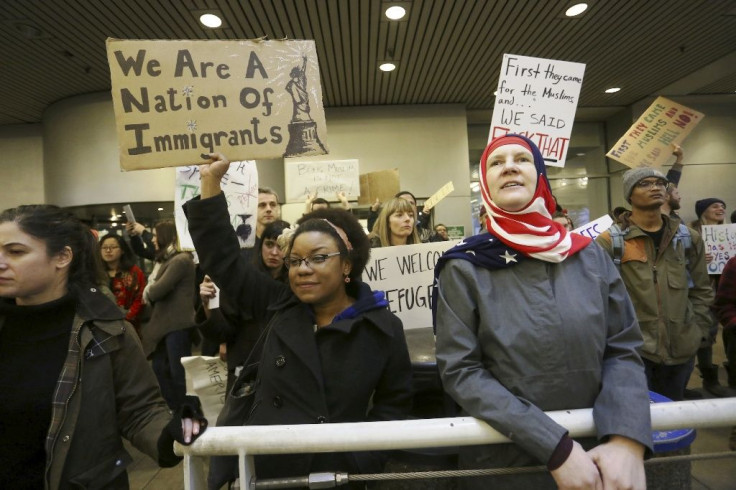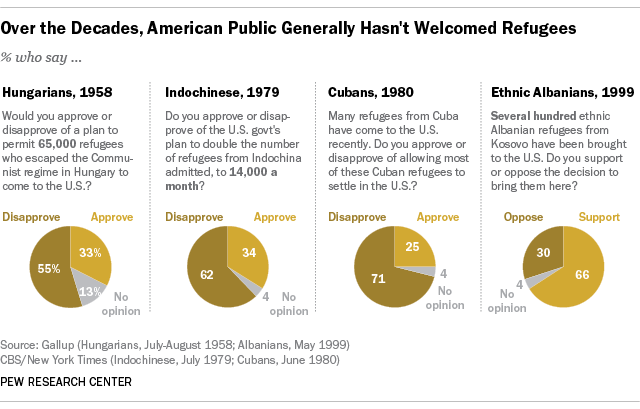Trump Travel Ban: Are Xenophobic Americans' Attitudes Changing Over Time?

Since signing executive orders that restrict entry of refugees and citizens from several “Muslim-majority countries,” and kick-starting the proposed U.S.-Mexican border wall, President Donald Trump’s disapproval ratings slipped further, according to a recent Gallup survey.
The disapproval itself has manifested itself in a barrage of protests with thousands standing up to oppose the orders across the country, in places such as New York, Washington, Boston, San Francisco, Dallas, Phoenix and Detroit.
However, the Gallup survey findings are a curious anomaly when compared to the analysis of data by Pew Research that gathered opinion-polling archives from the Cornell’s Roper Center for Public Opinion Research. The Pew study suggests that historically, the U.S. public has seldom approved of accepting large numbers of refugees.
Through some of the biggest humanitarian crises over the past century that have displaced thousands such as the World War II, the Hungarian uprising in the 1950s and Kosovo in the 1990s, to name a few, Americans have been resistant to provide safe haven to refugees, even though elected leaders and people in power acted against populist urges and admitted more refugees.
World War II
Although public opinion was stacked against admitting refugees from European dictatorships to come to the United States leading up to the war and after it, the U.S. still authorized the entry of 200,000 (later raised to 415,000) European refugees through the Congress-approved Displaced Persons Act.
Three polls, two from Gallup (in 1939 and 1948) and one from Roper (in 1938), found that an overwhelming majority of Americans opposed granting asylum to European refugees.
Hungary
Two years after the Hungarian uprising of 1956 was crushed by Soviet troops, when Gallup asked Americans their thoughts on resettling 65,000 Hungarian refugees in the U.S., more than half of the respondents disapproved of the idea. Eventually, 30,752 Hungarians were admitted under the Hungarian Refugee Act of 1958.
Indo-China
Despite domestic opposition toward allowing passage to the first wave of refugees after the collapse of South Vietnam in 1975, reflected in a May 1975 Harris poll, they were allowed to stay.
But, following another humanitarian crisis, when the second wave of refugees confronted then-President Jimmy Carter in June 1979, he decided to double up the number of Indochinese refugees to be accepted, to 14,000 a month.
His decision was not received favorably by the public, according to a CBS News/New York Times poll the following month that suggested that 62 percent disapproved of Carter’s action.
However, eventually, about 590,000 refugees from Vietnam, Cambodia and Laos were admitted to the U.S. between 1980 and 1990, according to federal immigration data compiled by Pew Research Center.

Cuba in 1980 and Haiti in 1994
After the Cuban government allowed the masses to leave the country, in late October 1980, some 125,000 Cubans arrived in south Florida. About 71 percent of respondents disapproved of the Cuban immigration, according to a June 1980 CBS/New York Times poll, even though eventually only about 2,700, or 2.2 percent, were returned to Cuba).
However, the official state response was very different when in 1994 more than several thousand Cubans and 20,000 Haitians who fled political violence at home were intercepted at sea. The public was also against the move, according to a September 1994 CBS/New York Times poll. Eventually, only about half the Haitians were admitted, though almost all of the Cubans (about 30,000) were accepted, according to a Brookings Institution report.
Kosovo
Only about 14,000 Kosovars from roughly a million displaced Kosovars found passage into the United States in the aftermath of the 1998-99 war between Yugoslavia and the Kosovo Liberation Army, despite the U.S. commitment to admit up to 20,000 Kosovar refugees as part of a multinational response to the crisis in April 1999.
Are Xenophobic Americans supposed to historically and naturally like Trump’s travel ban?
Although a poll from the right-leaning polling firm Rasmussen Reports indicated Monday that more than half of likely voters support Trump’s travel ban, the mass protests against Trump indicated that based on the changing political zeitgeist, a big proportion of the population is now resisting xenophobic tendencies, unlike their predecessors and are embracing humanitarian action.
© Copyright IBTimes 2024. All rights reserved.






















